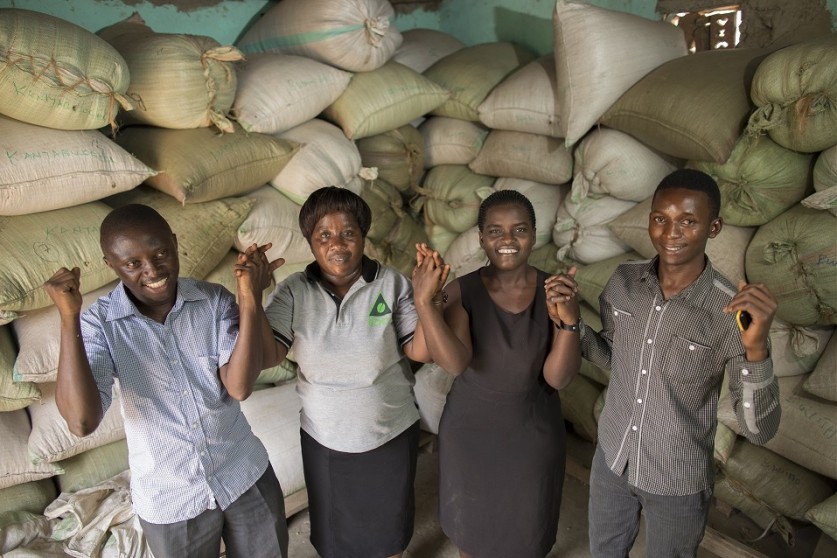Impact study: bukonzo
Uganda is Africa’s second largest coffee producer and provides a livelihood for over 1.8 million households. Farmers in Uganda produce both Robusta and Arabica coffee grown across five different regions. Each region has a different harvest period enabling Uganda to produce coffee year-round.
Bukonzo (BOCU) is a second level co-operative, registered in 2009, managing 13 primary co-operatives (these are small community level co-operatives who sell their coffee to BOCU).
BOCU are located in the Rwenzori Region of western Uganda in the district of Kasese, 230 miles from the capital city Kampala. Their 4,102 members span across the whole district with many farmers growing their coffee on the slopes of the Rwenzori mountain range which separates Uganda and the Democratic Republic of Congo.
Image: Medius Masareka, Bukonzo farmer, on her farm in Uganda.
Click here to read the full Social Accounts document.
BOCU is one of the few co-operatives in Uganda managed by a woman. Josinta Kabugho has been the General Manager of BOCU since 2009 and in her own words has “grown with the union”.
BOCU became a customer in 2014. We were the first international lender to work with BOCU and the finance enabled the co-operative to improve their forward planning, knowing how much coffee they could purchase, now they were no longer dependant on orders from buyers which was irregular and hard to predict.
Maureen Namusisi, Finance and Administration Manager of BOCU, said:
“Without these facilities, Bukonzo really wouldn’t be in business.”
In recent years, BOCU have also benefitted from the support of the Foundation to deliver projects supporting their producers to diversify into passionfruit production and beekeeping to generate additional income and increase their resilience.
BOCU is a double certified coffee co-operative holding Organic certification since 2009, and Fairtrade certification since 2011. BOCU have used the premium received from the sales of their Fairtrade coffee to implement social impact projects to support their employees, coffee farmers and wider communities.
Maureen, said:
“Farmers are attracted to BOCU because of other activities; tree planting, passion fruit farming, and water harvesting tanks. Farmers are hopeful they will also benefit. Hope keeps members at Bukonzo.”
Many farmers at BOCU farm on the hillside and are particularly vulnerable to the effects of climate change. To support these farmers Bukonzo launched an agroforestry scheme distributing 250,000 shade trees to be planted on the coffee farms to increase soil stability, reduce top-soil run off during heavy rain, and protect coffee trees from intense sun.
Beatrice Biira, a Bukonzo farmer, has been a member of BOCU since 2009 and manages a two-acre coffee farm which she first established in 1986 with her late husband. Alongside coffee she also grows bananas which she sells on the local market to supplement her income, and yam for home consumption.
Through BOCU, Beatrice received training in both agriculture and social development.
Beatrice said:
I studied agroforestry from BOCU, smart agriculture from BOCU, even I have learned much about gender and domestic violence from BOCU and I can train other farmers.”
Following this training, Beatrice started to implement good farming practices across her coffee farm including digging trenches, terraces and mulching all of which have contributed towards increased environmental resilience and improved production.

Josinta Kabugho Bukonzo General Manager, said:
“We have been there today and we will be there tomorrow with our partners like Shared Interest and other partners that have come on board.”
Image: Josinta (centre-left) and Maureen (centre-right) alongside Bukonzo associates.
Over the next five years, BOCU has ambitions to establish a roastery to enable them to add value to their coffee beans and make coffee accessible for coffee farmers and growing communities. BOCU have also set a target of increasing their membership from 4,102 to 5,000 farmers and increase the volume of containers they produce by three each year.
Click here to read our full Bukonzo impact study.
Back to Menu
